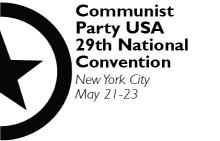 This article is part of the discussion leading up to the Communist Party USA’s 29th National Convention May 21-23, 2010. CPUSA.org takes no responsibility for the opinions expressed in this article or other articles in the pre-convention discussion. All contributions must meet the guidelines for discussion. To read other contributions to this discussion, visit the site of the Pre-Convention Discussion period.
This article is part of the discussion leading up to the Communist Party USA’s 29th National Convention May 21-23, 2010. CPUSA.org takes no responsibility for the opinions expressed in this article or other articles in the pre-convention discussion. All contributions must meet the guidelines for discussion. To read other contributions to this discussion, visit the site of the Pre-Convention Discussion period.
All contributions to the discussion should be sent to discussion2010@cpusa.org for selection not to the individual venues.For more information on the convention or the pre-convention discussion period, you can email convention2010@cpusa.org.
Many of our comrades, all over the country, have been involved in Cuba solidarity work, which we consider to be of the highest importance. Not to disparage the many other organizations and tendencies who also do valuable work on Cuba, our role in this is especially important because we have mass contacts and connections, e.g. with labor, which others do not, which gives us the responsibility to do the best job we can at making the Cuba issue something with a mass base.
Yet there is a problem of lack of coordination, which sometimes creates the impression we are not doing much. It is a classic example of the paradox stated by Lenin that “there are not enough people [to do the work] yet there are plenty of people”. In this discussion piece, I will make some brief suggestions for how we should change this.
There is not space here to review the history of U.S.-Cuba relations, other than to mention the fact that they are stuck in a harmful pattern, imposed by imperialism, that is detrimental not only to the Cuban people, but to working people in the United States also.
Unfortunately, the new administration has not yet moved to make major changes in U.S. Cuba policy, and will not do so without pressure.
The goals of coordinated, national level Cuba solidarity work should be the following.
- To end the U.S. blockade of Cuba by exerting pressure for the U.S. government to change the legislative and administrative regimes by which the blockade is maintained: The Trading with the Enemy Act, the Toricelli Amendment, the Helms Burton Act, the annual listing of Cuba as a “state sponsor of terrorism”, and the various administrative decisions and policies which are used to harass Cuba and its friends. This implies normalizing diplomatic and trade relationships between the United States and Cuba, and an end to US harassment of third country actors who try to trade with Cuba.
- To end the ban on normal travel between the United States and Cuba, especially the harassment of U.S. citizens and permanent legal residents who wish to travel to Cuba for whatever purpose.
- To end U.S. government support for counterrevolutionary groups and individuals inside and outside of Cuba, and to ensure that people who commit, or have committed, acts of terrorism and sabotage against Cuba are either prosecuted here or extradited.
- The normalization of diplomatic relationships between the United States and Cuba would entail also the end to restrictions on movement and petty harassment of Cuban diplomats and travelers in the United States.
- The immediate release and return to Cuba of the five Cuban patriots who have been given draconian sentences in a biased judicial process for taking actions against right wing terrorism that the U.S. government should itself have taken but did not. While we are fighting for this, there is also the goal of making sure the Cuban 5 are able to be visited by their wives and other family members, a right which is, at present, denied to some of them.
None of this can be achieved without a strong campaign to educate the U.S. public as to the truth about Cuba, or without a major, nationally coordinated lobbying effort, aimed both at Congress and the Executive Branch, for basic changes. Certain types of tasks, such as trying to have an impact on national media and organizing national-level legislative lobbying campaigns, require national coordination on our part also. But often those of us who are very much involved in the issue not only do not know, but have no way of finding out, what other Party members are doing in other areas of the country. This means very limited ability to coordinate. This can and should be changed, by the following items, for starters.
- Someone (or a small group of people) at the national level of our Party needs to be appointed to coordinate the Cuba work. That person or those persons need to have a full mandate to communicate with the whole party, and DOs should be requested to facilitate that communication. The main person given this job should be freed of most other responsibilities (other than those every Party member has) so that he/she can dedicate enough time to this coordination.
- We should make full use of our electronic communications systems to advance the Cuba work. On our websites, there should be a link to a series of pages dealing with practical tasks of Cuba solidarity: The Free the Five campaign, the latest legislative efforts, etc. The Northern Virginia Club, newly formed in the DC-VA district, is working to create a regional website capacity on Cuba solidarity work. This should be done at a national level also.
- There is a Party list-serve on Cuba, but it is not used enough. This should be strengthened and all comrades doing Cuba solidarity work should be encouraged to sign on to it.
Once we get a better coordination going, we can have a more structured, scientific approach to our Cuba solidarity work at the national level.


 Join Now
Join Now